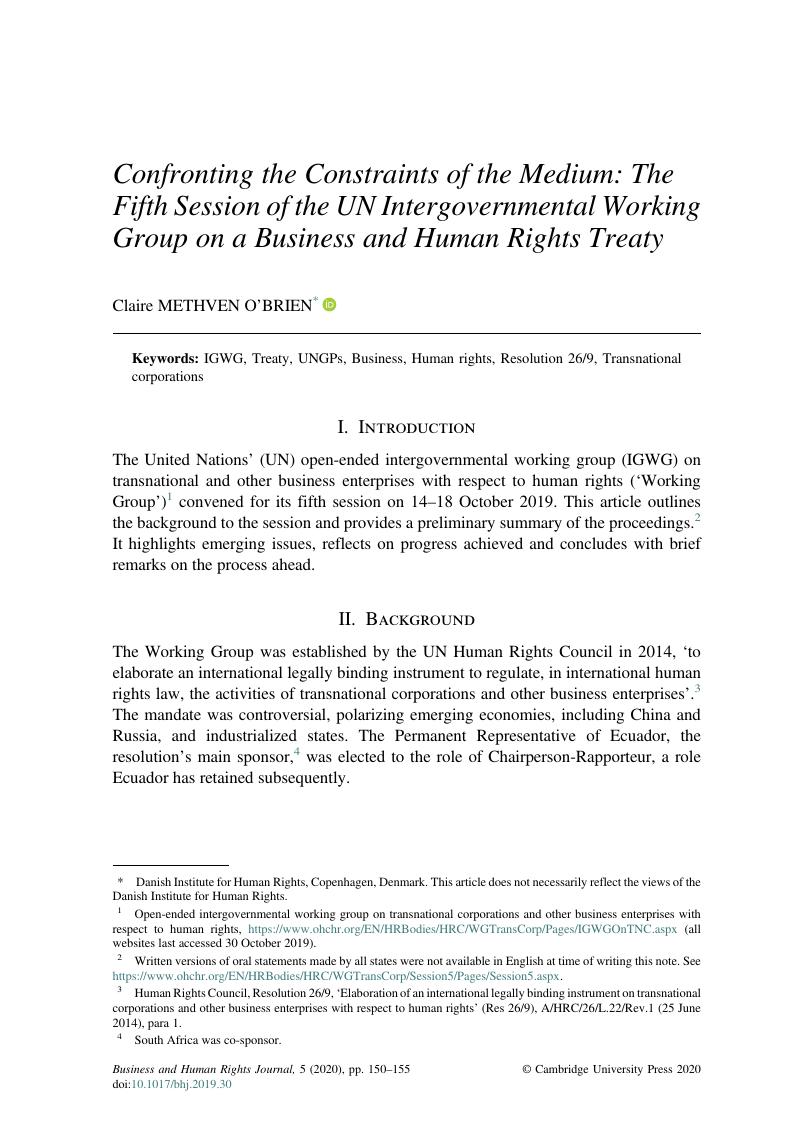Published online by Cambridge University Press: 02 March 2020

Danish Institute for Human Rights, Copenhagen, Denmark. This article does not necessarily reflect the views of the Danish Institute for Human Rights.
1 Open-ended intergovernmental working group on transnational corporations and other business enterprises with respect to human rights, https://www.ohchr.org/EN/HRBodies/HRC/WGTransCorp/Pages/IGWGOnTNC.aspx (all websites last accessed 30 October 2019).
2 Written versions of oral statements made by all states were not available in English at time of writing this note. See https://www.ohchr.org/EN/HRBodies/HRC/WGTransCorp/Session5/Pages/Session5.aspx.
3 Human Rights Council, Resolution 26/9, ‘Elaboration of an international legally binding instrument on transnational corporations and other business enterprises with respect to human rights’ (Res 26/9), A/HRC/26/L.22/Rev.1 (25 June 2014), para 1.
4 South Africa was co-sponsor.
5 Res 26/9, para 2. See further on the Working Group’s first two sessions, Humberto Cantú Rivera, ‘Negotiating a Treaty on Business and Human Rights: The Early Stages’ (2017) 40(3) University of New South Wales Law Journal 1200.
6 Footnote 1 to Res 26/9 provides that ‘Other business enterprises’ denotes all business enterprises that have a transnational character in their operational activities, and does not apply to local businesses registered in terms of relevant domestic law’.
7 Report of the Special Representative of the Secretary-General on the Issue of Human Rights and Transnational Corporations and Other Business Enterprises: Guiding Principles on Business and Human Rights: Implementing the United Nations ‘Protect, Respect and Remedy’ Framework, UN Doc A/HRC/17/31 (21 March 2011), Annex, adopted by the UN Human Rights Council: Human Rights and Transnational Corporations and Other Business Enterprises, HRC Res 17/4, UN GAOR, 17th session, 33rd meeting, Agenda Item 3, UN Doc A/HRC/RES/17/4 (6 July 2011, adopted 16 June 2011; hereafter ‘UNGPs’).
8 In 2014, 59 states attended on the first day but only 35 remained midweek: Lopez, Carlos and Shea, Ben, ‘Negotiating a Treaty on Business and Human Rights: A Review of the First Intergovernmental Session’ (2015) 1 Business and Human Rights Journal 111CrossRefGoogle Scholar.
9 Res 26/9, paras 5 and 6.
10 According to the Chair-Rapporteur, 99 states participated during the third session, compared with 60 at the first session, 80 at the second, 92 at the fourth, and 89 at the fifth: https://www.ohchr.org/EN/HRBodies/HRC/WGTransCorp/Pages/IGWGOnTNC.aspx.
11 ‘Elements for the Draft Legally Binding Instrument on Transnational Corporations and Other Business Enterprises with Respect to Human Rights’, Chairmanship of the OEIGWG established by HRC Res A/HRC/RES/26/9 (29 September 2017).
12 Cassel, Douglas, ‘The Third Session of the UN Intergovernmental Working Group on a Business and Human Rights Treaty’ (2018) 3 Business and Human Rights Journal 277CrossRefGoogle Scholar.
13 Zero Draft, 16 July 2018, ‘Legally Binding Instrument to Regulate, in International Human Rights Law, the Activities of Transnational Corporations and Other Business Enterprises,’ https://www.ohchr.org/Documents/HRBodies/HRCouncil/WGTransCorp/Session3/DraftLBI.pdf (hereafter ‘ZD’)
14 ‘Draft Optional Protocol to the Legally Binding Instrument to Regulate, in International Human Rights Law, the Activities of Transnational Corporations and other Business Enterprises’, available at: https://www.ohchr.org/en/hrbodies/hrc/wgtranscorp/pages/igwgontnc.aspx.
15 UN Human Rights Council, fourth session of the open-ended intergovernmental working group on transnational corporations and other business enterprises with respect to human rights, Oral Statements, https://www.ohchr.org/EN/HRBodies/HRC/WGTransCorp/Session4/Pages/Session4.aspx.
16 ‘OEIGWG Chairmanship Revised Draft 16.7.19, Legally Binding Instrument to Regulate, in International Human Rights Law, the Activities of Transnational Corporations and Other Business Enterprises’, https://www.ohchr.org/Documents/HRBodies/HRCouncil/WGTransCorp/OEIGWG_RevisedDraft_LBI.pdf).
17 RD, Art 2; cf. ZD, Art 2.
18 RD Art 3; cf. ZD, Art 3.
19 ZD Art 3(2); cf. RD, Art 3(3).
20 ZD Art 9, 9(2); cf. RD, Art 5.
21 RD, Art 5(2).
22 Updated Draft Programme of Work, Open-ended intergovernmental working group for the elaboration of an International Legally Binding Instrument on Transnational Corporations and other Business Enterprises with respect to human rights, Resolution A/HRC/26/9, https://www.ohchr.org/Documents/HRBodies/HRCouncil/WGTransCorp/Session5/pow.pdf.
23 Albeit attendance on the first day, at 51 states, was not higher than in 2015: cf. Lopez and Shea, note 8.
24 Human Rights Council, ‘Draft report of the fifth session of the open-ended intergovernmental working group on transnational corporations and other business enterprises with respect to human rights’, UN Doc. A/HRC/43/xx, available at: https://www.ohchr.org/EN/HRBodies/HRC/WGTransCorp/Session5/Pages/Session5.aspx.
25 See statement of, e.g., Brazil; cf., e.g., statements of South Africa and India.
26 See, e.g., statements of Brazil, Switzerland, Mexico, EU and Peru; few states called for a retrenchment of scope to TNCs (e.g., Cuba, South Africa) while some previously taking this position appeared more muted in their critique (e.g., China, India).
27 Opening statement of Mexico.
28 Compare, e.g., RD Articles 4, 5, 6–9. See further Claire Methven O’Brien, ‘The Home State Duty to Regulate the Human Rights Impacts of TNCs Abroad: A rebuttal’, (2018) 3(1) Business and Human Rights Journal 47.
29 The United States suggested that the RD pursued an unworkable ‘one-size-fits-all approach’: ‘The United States Government’s Continued Opposition to the Business and Human Rights Treaty Process, October 16, 2019’, No. 053-19.
30 RD Art 5(2).
31 Compare UNGP 1 (UNGPs, note 7).
32 Switzerland.
33 For example, Opening statements of India and Mexico.
34 Claire Methven O’Brien et al, ‘National Action Plans: Current Status and Future Prospects for a New Business and Human Rights Governance Tool’ (2016) 1(1) Business and Human Rights Journal 117.
35 Jolyon Ford and Claire Methven O’Brien, ‘Empty rituals or workable models? Towards a business and human rights treaty’ (2017) 40(3) University of New South Wales Law Review 1223. Claire Methven O’Brien, “Experimentalist Global Governance and the Case for a Framework Convention Based on the UN Guiding Principles on Business and Human Rights” in Matthew Mullen (ed), Navigating a New Era of Business and Human Rights: Challenges and Opportunities under the UNGPs (Nakhon Pathom, Article 30, 2019).